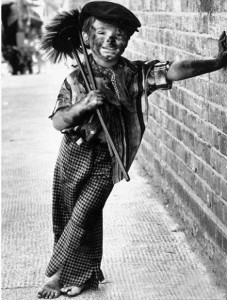On Empathy and Research
 I’m not a research historian. I’m sorry if I’ve disappointed you, or if that somehow belittles what I do. But I don’t believe in pretending to be what I’m not. What I am is honest. What I am is empathetic. Now and then, however, I get a little tired of being bombarded by bombastic pedants, who would belittle the work I do (or that my friends do) in order to make themselves look like experts. It happens more than I’d like. And frankly, I’m tired of it.
I’m not a research historian. I’m sorry if I’ve disappointed you, or if that somehow belittles what I do. But I don’t believe in pretending to be what I’m not. What I am is honest. What I am is empathetic. Now and then, however, I get a little tired of being bombarded by bombastic pedants, who would belittle the work I do (or that my friends do) in order to make themselves look like experts. It happens more than I’d like. And frankly, I’m tired of it.
I’ve been posting a lot of research pieces lately, not only on my blog, but in other places. I find such pieces very difficult to write. History is so complex and many layered, and fitting all the necessary details into a 1,000 word post, is often nigh to impossible. Drawing conclusions about those details, making judgments or ‘aspersions’ is…well, it’s dangerous. But it’s also, in my opinion, necessary. How does one learn anything useful or improving without making a judgment, of one kind or another, about it? You don’t. You can’t. For a research historian, perhaps this is right and proper. For a novelist, it’s wrong. And I’ll tell you why.
The fact of the matter is, there are different types of research, necessary for different purposes, and conducted by people who simply function differently and under different motivations. There’s nothing wrong with that. There’s never one way to do anything. What it comes down to is how we think, how our brains function, how we see the world, and what we wish to gain from studying the history of it. Another thing I think it comes down to, is an ability or inability to empathise with historical facts and figures. Because unlike Math or the Sciences, History’s facts and figures are, or rather were, people.
I’m also a sort of a hobbyist psychologist. That is, I study personalities. I find it useful in my writing, but more than that, it’s useful in my daily life. There are basically two cognitive functions, those being sensing and intuition. Those who rely on the sensing cognitive function are great at collecting data, remembering dates, names and places. Such data is easily gathered and stored in the memory of the sensing individual. What can be seen, touched, held, remembered, these matter most.
I’m not a sensing individual. I’m the other kind. The weird one few understand. I can gather data as well as anyone else. What I can’t do is remember it. My brain, as much as I’d like it to, just doesn’t work that way. What I can do, however, and I do it quite well, is it forms impressions of things, I see broad patterns and trends, I can understand, and reproduce, how it may have felt, to live in a certain period of history. I may not be 100% right. It may just be my interpretation. But my guess is as good as anyone’s. I’ve not met anyone yet who possessed a time machine.
What lately helped me to see that this difference in method comes down to individual ability and motivation was an article sent to me by another writer friend. The article is on how most criticism is based on a lack of ability to empathise. Seemingly it has little to do with research. To me it has a great deal to do with it. Do you welcome discussion about your topic of choice? Or do you feel challenged by anyone with a differing opinion? If you cannot see the other person’s point of view, does that not reflect an inability to empathise?
But what about casting judgment? Does my lamenting the wrong done to the Jew in Hitler’s Germany (and elsewhere) mean I have an inability to empathise? Or do I, in feeling sorrow for their plight, in feeling the weight of that tragedy, judge Hitler and his minions? I do both, of course. Hitler was an evil man. I have judged him. Now, to do justice to history, I must try to understand him, to try, if I can, to learn what made him into the monster he became.
I do understand the caution against making simple judgments about historical figures and events. There is nothing at all simple about history, because there is never anything simple about people. For me, it isn’t enough to simply learn about history. I want to learn from it. I want to delve deeper, to explore the hows and whys of it all. Dates and facts and names will get me so far. I want to go farther. Eventually I am going to make a judgment. I am going to ask myself if I would have behaved similarly in their shoes, and why or why not. I’m going to ask myself what prices we are still paying for the decisions made by the men and woman who came before me. How is life better? How is life worse?
We cast judgments. It’s what we do. The irony is that those judgments, historically speaking, are rarely about individuals. They are about the pitfalls of vice, or the rising and falling of civilisation. I wouldn’t dare cast a judgment on a husbandless mother in Victorian England, but I can look back on it and make judgments about the conditions that placed women in such desperate situations, or that would starve children and drive them to work, scampering up chimneys and working on the streets to bring home (if they had a home) enough to eat. Did they understand it then the way we understand it now? Possibly not. And so my job, then, is to try to stand in their shoes. To try, if I can, to look at it from every angle, from the gentleman’s wife who doesn’t want the dirty little beggar in her house, to the gentleman’s children who wonder what it’s like inside a chimney, or if the little fellow doesn’t want a bit of tea. Life was different then. It wasn’t so different as to remove human feeling.
 But I’m not a historian. What I am is a novelist whose primary aim is to teach, and to do it in a setting that is as accurate as humanly possible. The problem is, history is, well, history. None of us has ever spent any actual time in the Regency or Georgian or Victorian eras. None of us really knows what it was like. What we can do is read as much as we can, try to immerse ourselves in the atmosphere of it, read biographies, and histories, and studies. Better than that, read letters and journals and other contemporary publications. And then put ourselves in the shoes of those who walked there. This requires passing judgement, presuming, if you will, upon history. But as a novelist, it’s the very best thing I can do for my books, and for my readers.
But I’m not a historian. What I am is a novelist whose primary aim is to teach, and to do it in a setting that is as accurate as humanly possible. The problem is, history is, well, history. None of us has ever spent any actual time in the Regency or Georgian or Victorian eras. None of us really knows what it was like. What we can do is read as much as we can, try to immerse ourselves in the atmosphere of it, read biographies, and histories, and studies. Better than that, read letters and journals and other contemporary publications. And then put ourselves in the shoes of those who walked there. This requires passing judgement, presuming, if you will, upon history. But as a novelist, it’s the very best thing I can do for my books, and for my readers.
Rightly or wrongly, it all comes down to empathy. Agreeing or disagreeing with another person’s research, unless the bare facts are just wrong, comes down to empathy, too. Can you see how they came to their conclusion? If you disagree, then why? Is it because you know more, and you are the expert and how dare anyone challenge you? Is it an inability to see where they came from? And do you care?
Personally, I find the world more interesting with different points of view. No one owns a monopoly on history. I know I don’t. And people aren’t afraid to remind me of the fact. I’m happy to discuss it, so long as you can do it in a friendly and respectful manner. If not. Move along. I’ve got some research to do.



